Executive Interviews
Our Executive Interviews feature top leaders from across the disciplines that we specialise in, sharing their career advice and experience with candidates seeking success in those sectors.
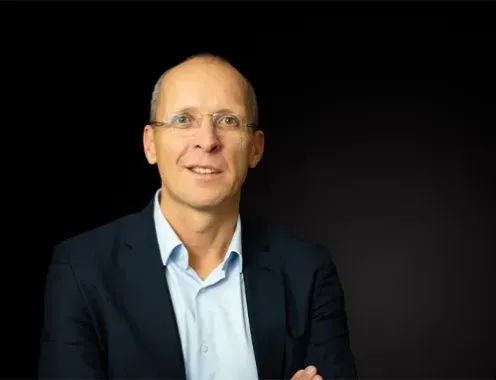
Helmut Leitner - Founder of Heliblick
Helmut Leitner is the Founder of Heliblick in Zug, Switzerland, a management consultancy that developed the iBsing framework. He is also a Board Member at CSCMP Roundtable Switzerland, after having a successful Supply Chain career in companies such as Johnson & Johnson, Merck, Sharp & Dohme and Smith & Nephew.
You have successfully developed the Integrated Business Sensing (iBsing) framework. Can you tell us more about this and, in particular, how it can be leveraged to manage complex transformations?
Around 20 years ago, I was offered the position of S&OP Manager at Johnson & Johnson. I did not know what Sales and Operations Planning was, but it sounded interesting. I found out that it was about balancing demand and supply in the three to 24-month horizon, and about connecting the Sales-silo with the Operations-silo.
Later, I found out that S&OP works much better if you combine it with Sales & Operations Execution (S&OE), which takes care of all the short-term challenges in the next 12 weeks. For many years, S&OP and S&OE were an extremely powerful tandem to excel organisational performance in a predictive business environment.
In the meantime, S&OP has further evolved to Integrated Business Planning (IBP). The objective is to support the organisational vision and organisational strategy by integrating all departmental plans: Commercial plan, Product plan, Manufacturing plan, Procurement plan, Finance plan. But can everything be planned and predicted? In the last decades, the business environment has changed. We know that not every change can be planned, because the world is more volatile, complex and disruptive; a lot of change is just emerging out of the moment.
Therefore, the “predict and control” approach in IBP is not sufficient for many challenges, and a “sense and respond” approach is required. Integrated Business Sensing (iBsing) is a framework that enables teams to take a helicopter view and to understand, what’s going on in this moment?, and to interact with the key values partnership, entrepreneurship and mentorship to find the optimal response. IBP and iBsing are a tandem to deliver excellent performance in the VUCA information flow.
With the implementation of S&OP, Supply Chain took the role of integrator of the different business functions. Going forward, I think that Supply Chain will take a key role in facilitating governance processes to consistently improve the framework of E2E decision-making. On the other side, Supply Chain has an important facilitator role to resolve business conflicts.
What advice would you give to someone starting their career in the Supply Chain discipline?
My advice would be: Be curious and be yourself! Supply Chain is an extremely broad and complex field. At the beginning of the career, it may be good to get a generalist overview and to understand processes and systems across the E2E value chain.
Since Supply Chain is all about people, it is also important to consistently improve leadership competencies in parallel. A special leadership feature in iBsing is the capability to take a helicopter perspective and to increase self-awareness, and also to understand personal needs of colleagues and business requirements of the organisation, customers and suppliers.
For anybody - whatever their own motivators, interests and skills are - you can specialise in Supply Chain and still be yourself.
People that like structure, and are interested in processes and digitalisation, may find great purpose in developing the process or system capabilities of the operating model. People that are more leaned towards the soft side of management may enjoy facilitating cross-functional conflict resolution for critical business challenges as part of the IBP process.
Whatever you are passionate about - communication, digitalisation, marketing, financials, problem-solving, team-building, learning about different cultures - it’s all needed in Supply Chain.
What is the most surprising thing that has happened during your career?
Some years ago, I had an exciting job - a lot of responsibility on my shoulders - and I was struggling with my workload. All my focus was on operational priorities, organisational changes, system implementations and team development. I asked my mentor for advice. I did not expect the answer: Nourish your external network.
I was super busy with managing relationships within the organisation with the team and internal stakeholders; I saw little benefit investing my valuable time into relationships with people who were not connected to my organisation and who were focused on topics not directly related to my daily challenges.
A few months later, my mentor invited me to build CSCMP Roundtable Switzerland, a non-profit organisation to foster networking and learning between Supply Chain professionals. With some doubts, I accepted the invitation, and we kicked off the initiative with other Supply Chain professionals.
A few years later, I know from experience that a strong external network is a source of inspiration and learning, opening your mind for new ideas and new initiatives, providing unexpected support and advice when needed, and building valuable connections and friendships.
How do you see the workplace changing, especially within Supply Chain functions, as we emerge from the global pandemic?
People will be working more from home in the future, but I also realize that there is a strong desire to have face-to-face interactions, especially from the young generation. At the end, there will be a good balance.
For the iBsing approach, teams are coming together every three months for a workshop followed by a small social activity, like a barbecue. Between those workshops, the team does interact via virtual meetings in weekly or biweekly governance calls. That seems to be a very efficient and effective set up. And, since teams are meeting at least once a quarter, a trustful relationship is evolving.
Your business, Heliblick, has gone from strength to strength this year. What has been a memorable moment for you in 2022 and why?
After two years of iBsing development, I had the opportunity to apply the iBsing framework for the first time at full scale at a big customer. I have been working with a fantastic team of 15 change agents.
A memorable moment was when the team presented the first target condition to the CEO, and the CEO wondered if the team’s intent was too ambitious. The team insisted in the discussion that the target condition is realistic – and, three months later, they delivered.
In the meantime, they have successfully completed the third target condition already. Every moment where I can see that the team members are fully engaged and enjoy the transformation is an energizing moment also for me.
Thank you to Helmut for speaking to Neil Cope, Associate Director in our Procurement & Supply Chain recruitment division in Switzerland.
Views and opinions contained within our Executive Interviews are those of the interviewee and not views shared by EMEA Recruitment.

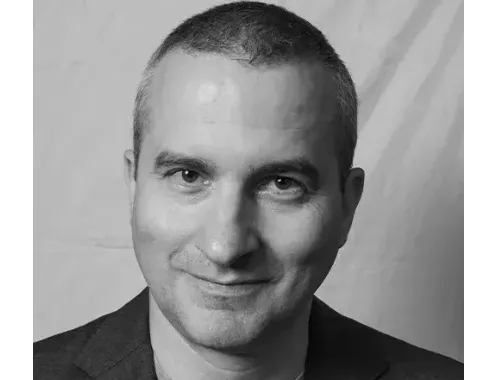
Giovanni Manchia - CHRO at I-Sec International Security
Giovanni Manchia is the CHRO at I-SEC International Security in Amsterdam. He started his HR career at Shell, before working at companies like American Express, Rabobank and dfcu Bank. Alongside working across various countries and jurisdictions, Giovanni’s career has also taken him to Africa.
Tell me more about your organisation, I-SEC, and the culture there.
I-SEC is an organisation mainly focusing on aviation security. We have more than 6,000 people across the world. We are based at a number of airports in different markets, where we can provide the services for making sure that you and your family are able to travel safely.
If you look at our overall strategy, and also how we position ourselves as a business, we clearly say we are a people's business. I know this is a remark that a lot of companies are making, but in essence, this is the only thing we have. Our business is not about big machines, it's about people.
We rebranded our core values. We discussed the essence of our company and the things that really distinguish and characterise us – that was a big exercise. In the end, we decided on four different things.
The first was: People first. We said that people first is not only for employees, but also with our clients and passengers. Whatever we do and whatever anyone does in this company, it always needs to put people first. So, always make sure that if you need to choose between processes, systems or people, always choose people.
Secondly: Achieve impact. This means, whatever you do, make sure you have an impact on your colleagues, on your organisation, on yourself, and - most definitely - on our clients and our passengers.
Thirdly: Enjoying our work. We need to have fun, but we also need to make sure we do it together, because enjoying our work is crucial and we are part of a bigger community.
The final one was: Respect rules. Other companies will say, we bend the rules, but - if you're in the security area or the safety industry - people need to know where the thresholds are. So, we said, whatever we do, we need to make sure that we provide safety for everyone and that means respecting the rules all the time.
How do you embed these values in the organisation?
To make sure that everybody acts in the spirit of these core values, you need to translate them into very tangible behaviours and make it as pragmatic as possible.
One of the biggest challenges in every organisational is transformation and really making sure that you are focusing your organisation on the desired behaviour. It’s easier said than done, but what I've seen so often with HR people is they tend to like the first part - the design, the conceptual, the high level – but, how do you then make sure that it works in practice with everyone in your organisation? I would say a million mini steps help to ensure it will happen.
What do you perceive to be the biggest challenges over the next 12 months for your business and your role?
HR is quite fun in this organisation and this industry, because it really has an impact on the bottom line. Our biggest challenge and our biggest opportunity for growth is making sure we get sufficient qualified staff. Perhaps that’s a no-brainer, but that’s either blocking or hindering our business.
If you talk about recruitment in this business, this is not about one, two or ten people; this is about hundreds and hundreds of people. It’s volume recruitment and, at the same time, you also have quite a lot of quality checks. By the time you have assessed and monitored everything, you don't have that many people left.
You need to get large amounts of people into this funnel, and that's probably the biggest challenge that we have. Looking at how to we attract and retain these people, while also keep them motivated and happy, that is a challenge.
How would you assess the economic and business outlook?
Nobody can predict the future, but - if you look at the current projections now from the airlines and airports - the growth that they foresee is still quite significant. We're not yet at the 2019 levels, but they expect that we will be there in the visible future.
Obviously, our business is specialised, so we had a really tough time during COVID, when all of a sudden everybody stayed at home, but people now are keen to travel. Business travel has picked up and people still want their holidays to foreign countries.
I was particularly interested in the time you spent in the Managing Director role for the business. Can you tell me how that came about and how it changed your responsibilities within the business?
I had operated for a long time in a dual role - I was the CHRO for the group and also the HR Director for the Netherlands.
At a point in time, the Managing Director, who I had a very close relationship with, was out of the business for a number of months. So, we decided - alongside our group CEO – that, for the interim period, I would take over that role.
If you're in HR, in a people intensive business, you’re in the position to have an influence on the total enterprise, and it was a good opportunity for me to take over the whole ship. It was an interesting experience, because it happened at the time when travel picked up significantly and every airport in Europe, including Schiphol in Amsterdam, had these challenges.
It gave me the opportunity to look at HR from a distance. As a specialist, you tend to think that everything is related to your specialist area. Well, now you need to do things in balance, so you need to look at things more holistically.
I know it's a cliché, but it's lonely at the top. At the end of the day, you need to make decisions, you need to say whether you go left or right, and often on insufficient data. You have to have the guts to make that decision and live with the consequences.
It was a very interesting, unexpected assignment and I enjoyed it.
For people that are developing their career in HR and are wanting to ultimately secure a leadership role, is there any advice that you could share with them?
If you like the profession and if you really want to make an impact, you need to understand the business. In HR, you have the fortunate situation where you can relatively easily move to different industries. I have worked in oil and gas, IT, healthcare, security, banking, and financial services, but you really have to understand what makes the business tick.
We can talk about talent management, succession, comp and ben , but how do you utilise and leverage the employees in such a way that it makes the most impact in your business? Start with that and - if you do that - then you can build up a trustful relationship with your leaders, because they know you understand their business.
Always treat yourself as an equal. That's sometimes challenging in HR, because you start in roles where you're junior from an age perspective compared to the leadership you work with. Stand by your principles and believe you are the expert. If you act more junior, they will treat you more junior.
Who do you admire most in business?
One person I still admire is Kenneth Chenault, previous CEO of American Express. I was fortunate to meet him a few times during market visits, and the way he was able to establish a culture of trust and partnership, while also focusing on customer service, clients and employee engagement, was extremely impressive.
I've seen many leaders at the height of their career start to become what I call presidential. What I found so remarkable about Ken is his ability to be so humble and charismatic at the same time.
What does the future of HR look like? How is the discipline going to change in the coming years?
What really strikes me are developments like the Great Resignation. What you now see is that people are really just moving out of the corporate life at various levels. Maybe we'll enter an economic crisis, but the fundamental challenge is that there will be a shortage of staff significantly across the western world in the coming years and organisations will be competing for scarce talent.
When we talk about Human Resources, we need to think about how we can win the hearts and minds of people. It’s all about the employee experience and making a psychological connection with your employees. We will need to learn what they expect from you as an employer.
How do you make sure that people run the extra mile for you and are loyal to you?
If businesses are in a situation where there are signs of a recession, senior leaders often just fall back to primary behaviours and only think about cutting costs. There are a couple of English expressions I have always loved. “Penny-wise, pound-foolish” means you can make what sounds like a logical decision in the short-term, but that may hit you in the long-term. That's the one thing you always need to keep in mind: try to have a long-term strategy in this turbulent world.
Additionally, I realise that, from a business point of view, to be able to talk about the future, you'll first need to have a future, so that's always a balance you need to have.
I also believe HR analytics is key; it’s difficult to do anything successfully without data. If you really want to become the business partner, you need to understand the data and you need to quantify what the impact is on the business. The more you can do that, the more successful the HR function will be.
You’ve spent some time working in Africa. I’d love to hear more about that and what your remit was there.
In Uganda, I was introduced through Rabobank, and helped the board and the management team of dfcu Bank to develop a new operating model.
It was a phenomenal experience, not only from a cross-culture point of view, but definitely also from an intellectual point of view. To help such an organisation in such a distinct culture with transforming their business was one of the best experiences I had at that point in time.
At the Lion Heart Foundation in Sierra Leone, I did a voluntary assignment where I worked with the board to strengthen the organisation, which is a local rural hospital. We wanted to transition into sustainability to ensure the hospital was self-supporting in the future.
We were able to create a learning culture inside the organisation, to make sure that people felt empowered to really grow. We established things like scholarship funding to build up their capability and trained people from the community to become nursing assistants, which really embedded the organisation in the community, and they became a good employer.
It was not always easy, but it was a phenomenal experience.
If you didn’t have a career in HR, what route might you have taken?
I feel blessed that I choose this profession. It has brought me to many destinations in the world, and I could never have imagined I would do transformation projects in countries like Uganda or in Sierra Leone.
There have been many times where I have thought, this is unbelievable that I get to do this, and I get paid for it, as well!
I have the dual role, because I'm also in the academic world, so if I were to move in another direction, it would probably be further into that world.
How do you relax when you've got some time to yourself?
I love to travel and I love to spend time with friends and family - I get energy from that.
In terms of travel, if you travel for business, it’s a little different than if you’re travelling as a tourist; you see a subset of the country, because you deal with local people and you get to learn more about local cultures.
I have developed a soft spot for Africa, that's for sure - it really gets into your skin. The energy and the vibe that you experience there is really contagious.
Thank you to Giovanni for speaking to Katie Insley, Associate Director in our HR recruitment team in the Netherlands.
Views and opinions contained within our Executive Interviews are those of the interviewee and not views shared by EMEA Recruitment.

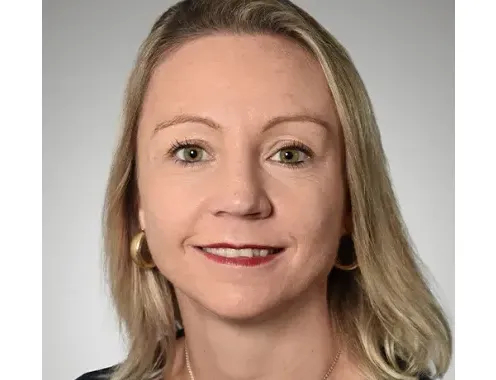
Celine Heinrich - Director, Europe & Middle East at AGCO Corporation
Celine Heinrich is the Director, Europe & Middle East at AGCO Corporation in Schaffhausen, Switzerland. She started her HR career in Dubai, before moving to Zürich in 2013. Celine has acted in her career as Regional HR Head, Global HR Business Partner & Director, Total Rewards EME & APA.
How did you plan out your career development path?
Thinking backwards, job opportunities came along to me. Starting my career in Dubai in 2002, it was a very fast-growing market. A lot of multi-national companies had HR opportunities, because they were the first roles to grow the company.
I always work very hard and what has help me in my career development was connecting with people, transmitting a positive attitude and always building a culture of trust. Another aspect was maintaining a professional internal and external network, driving collaboration, learning from my mistakes to get back up again, and follow people who inspire me.
Finally, I believe you create your own opportunities, with great leadership qualities through real-life situations, and it’s also the way you treat others. I always try to know my people, meet them where they are, and be flexible; this creates internal opportunities. And, plan your career ahead!
What would you say is the most rewarding part of your role?
It’s spotting moments that matter for our organization’s employees and managers, interact with people to understand the moments that matter to them, and ensure that we check in over time, to ensure these moments still matter.
It's also going to bed each night, saying that we did the best we could for our business and our employees, and we worked with people we love.
What are your growth plans?
Working as a Global Strategic HR Business Lead, as business becomes increasingly global, companies need to improve their ability to build and manage a global workforce. By 2050, the global population is expected to grow by 50% — primarily driven by India and China.
Looking ahead, the business world is changing, and HR needs to adapt accordingly to contribute to long-term shareholder value. Although efficiency, effectiveness and compliance are still important, continued transformation is on our HR agenda now. HR capabilities do not just support the business strategy, but enable it — making it possible for the business to design and execute strategic moves that capitalize on HR's capabilities.
We must create an operating environment in which global and virtual teams can thrive, including global mobility programs that make it possible to move employees between countries efficiently and easily; standardized and repeatable HR processes and systems for entering new markets.
Being a sparring partner is a pre-requisite for an HR division. What do you feel makes an effective sparring partner?
It’s showing trust, humility and authenticity. To be able to step into people’s shoes, given their business experience and understanding the strategic context. Understanding that leadership visibility and robust communications are key to establishing trust, we need to be looking to strengthen relationships with both internal communications and leadership teams, educating where necessary on the value of trust for business performance. Open communication, walking the talk and transparency should form the basis of our strategy, aiming to bolster employee trust.
Being an effective partner is also to offer cross-cultural knowledge, as multi-national companies compete on a global scale, sparring partners should have a keen sense of cultural awareness in the areas where an organization operates. This includes an understanding of cultural values, local labor laws, local business practices, and to foster collaboration to encourage inclusive and productive work as teams.
What changes have you seen in the employment market in Switzerland over the years? What, in your opinion, have been the drivers for these changes?
The pandemic was among the toughest, slap-in-the-face moments in recent history, to remind us that everything in our lives can change in a moment - not just at the individual level, but at a company and global level.
COVID made working from home possible. For a long time, most Swiss companies were not used to having people working from home. Switzerland accelerated the use of new technologies, such as cloud computing, social media and mobile devices. It’s helped HR to deliver services more efficiently and effectively. Today’s employees expect the ability to access HR systems and services 24/7, from anywhere on the planet.
Companies have redesigned the workplace to support organizational priorities and redefine the purpose of our office space, including more collaboration rooms to ensure the combination between being physically in the office and working from home, to maintain productivity, collaboration, learning and to preserve our corporate culture.
If you could change one thing in your career, what would it be?
Well, I am grateful of my career so far. But if I had to change one thing, it would be not always being able to address the right behaviour of some of senior leader and, ultimately, help our organization for even better results. I believe: “Do what is right, not what is easy!”
What does “leadership” mean to you?
Leadership is about influence, not authority: “A sign of a good leader is not how many followers you have, but how many leaders you create”, a motto from Mahatma Gandhi.
Thank you to Celine for speaking to Keely Straw, Associate Director in our HR recruitment team in Switzerland.
Views and opinions contained within our Executive Interviews are those of the interviewee and not views shared by EMEA Recruitment.

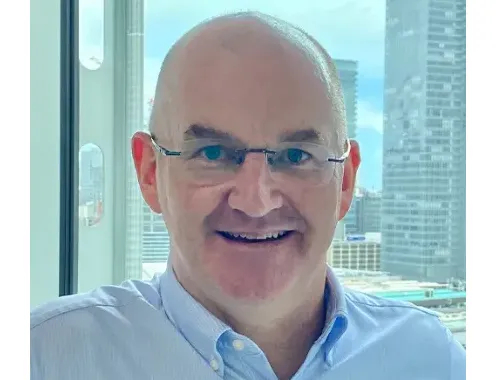
Angus MacGregor - Head of Global HR at MUFG Bank
Angus MacGregor is the Head of Global HR at MUFG Bank. He has been in senior HR roles for 16 years, having started his career as a solicitor. Angus moved into Human Resources in the banking sector in 2006, with Barclays Bank.
How do you feel that the workplace and working styles have changed post-pandemic?
We are not quite out of the pandemic. Thinking globally, I have travelled around most parts of the globe, so I have seen it in action. The major change is absenteeism in the office; there’s generally lots more space. I’ve been able to see about 15 different countries in Asia, Americas and EMEA, and the common theme is there’s a lot less people in the office: it’s an obvious statement that’s happening everywhere.
Employers and employees are currently both trying to work out the most efficient and productive way of working, rather than just focusing on compliance or safety. So, it’s moved to trying to benefit the firm around getting the right balance.
I don’t think it has worked itself out yet; a range of employees are adjusting to how they want to work, which requires time and discussion.
I think the workstyle change will move to less office time. This will include using the office more effectively and “selling” it as a place to come and brainstorm, have on-the-job training, and the necessary social interactions. Sometimes, it will be a requirement to be in the office to get something done, for example, a transaction.
I think it will work itself out into a range of full-time, hybrid and remote for most workers in most businesses. However, there’ll be stresses when individuals make demands which are different from the company’s requirements - a gap between what the employee thinks and what the employer thinks - and that will be assessed by performance and outputs. That is very difficult to measure, because most jobs are a discretionary effort and quality of product.
The last comment I’d make is about travel appetite. It is currently quite low - I’m referring to international travel predominantly. You would think that lots of people want to jump on a plane, but I think a lot of those trips are now seen as not necessary and the worker feels that they probably don’t need to make the trip, because they can do it remotely. Add to this that it's currently very expensive to travel. Obviously, there are certain trips that are required, but they are either revenue-based, risk-based or control-based, rather than about engendering purpose and engagement.
The main worry I have is about levels of engagement and purpose of workforce, because - if there’s not something positively done to address - it won’t manage itself. Like before, we all came to work and engaged with each other in various ways; now it’s more disparate and people have got to have active strategies to engage with other team members.
In terms of the role of leadership, I think a lot of people have managed remote working in some sense, but some people found it quite difficult, so I think the big element is trust. New training will come out over the next few years, such as “productive hybrid” management. This training needs to find a way to discern between (say) two employees' performance and adjudge fairly who is the better employee over time for promotion.
We are respecting local management and local teams as to what they require, and I think the sense is there is an importance of the office, but it is about articulating that in the local market. Currently, people are still not certain about returning to the office, and it is a mixture of concerns for their safety and current remote working being perfectly suitable in the situation, from the employee perspective.
How do you think the HR function and the wider discipline is likely to evolve if we fast forward five or ten years? What does the function look like and how does it serve its purpose for the business?
COVID has put it further up the corporate pecking order, no doubt.
I think, over time - let’s say ten years - most businesses of size should have reasonable systems, digitalisation and probably some robotics within their HR services. So, all the services of payroll, plus anything required for the employee, should be self-service and usable by most levels in the organisation.
You will get fewer “dinosaurs” at the top who will want their HR person to do their admin, but I think - supposing you get the systems pieces right - then you must get into what I would like, which is basically the strategic advisory OD markets like that, but stick to your guns and your judgment. I just quite like listening to him and he’s done extremely well from lowly beginnings.
Then, there’s a woman – again, I won’t name her - she was my first HR mentor. She basically took me in at Barclays and said, “Why don’t you come and work in HR?”. She said to me, “I think you could do this job.” A lot of the time, I buy into the person, and her work ethic was just unbelievable.
Her time management, her approach to work, but also, she would go “deep”, and she knew how to work a long day, but she did it in a way that was positive, and was very data-driven and analytical about her decision-making. The significant bit - her focus actually - when she was talking to me, I was the only guy in the room: “What do you think about this?” and I’d give an answer. There was no distraction; that’s quite a skill to be at that level - she’s got 110 things on - so I tried to bring that skill into my job.
Are there any books, podcasts, blogs that you particularly enjoy that you could recommend?
I listen to quite a lot of podcasts, and I also read quite a bit. There’s a guy I’m really into now called Tim Ferriss. Basically, he interviews people. He’s done about 600 now. He’s a 42-year-old American, he’s semi-famous, as he wrote the 4-Hour Work Week, which distils down how you can do your job effectively in four hours, and the content is very good.
The podcast that I’m listening to now is on the three brains, which is basically your brain, your heart, and your stomach are all brains; they’ve all got brain cells and they all operate as a brain, and he was just talking about how you manage those three, so that’s quite interesting.
There are two books that I’d recommend to everybody. One is Malcolm Gladwell’s Blink. Gladwell writes a lot of stuff on psychology, mostly personal work, and Blink is about taking a short-term view and then a long-term view and acknowledging your gut reaction. The last one is Think Again by Adam Grant. The basis around that is changing your mind and why that’s not a bad thing. It’s quite good to dip into those books.
Thank you to Angus for speaking to Katie Insley, Associate Director in our HR recruitment team in the Netherlands.
Views and opinions contained within our Executive Interviews are those of the interviewee and not views shared by EMEA Recruitment.

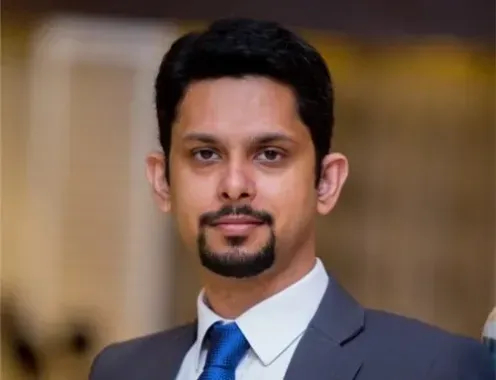
Faraz Naseem Syed - Head of Commercial Finance at Unilever Europe
Faraz Naseem Syed is the Europe Head of Commercial Finance – eComm & Omni Retailers at Unilever, having joined the organisation as Europe FP&A Controlling Lead – Logistics & Supply Chain. He previously spent over ten years at A.P. Moller, as Senior Manager – Corporate FP&A.
Within your career, I can see that you were given some good opportunities to travel and experience different countries. Can you tell me a little bit about how you adapted to, not only different cultures, but the change in diversity of your roles?
Yes, I’ve been lucky in the sense that, within APM Maersk specifically, they had great emphasis in giving global exposure to the key talent. I particularly chose China because I was interested in that part of the culture, along with experiencing the fastest growing economy in the world. Plus, if you're any sizeable global company, it's imperative that you will have a large footprint in China. So, this is a good experience to have under your belt.
One of the things I realised when moving to a new country was that you need to adopt to the ways of working and cultural business practises in that country, even if it's within the same company, it also has a lot of local influences. One thing that helped me was having a cultural mentor and I also tried to make some local friends - from my work and outside - and that helped me speed up learning about how things work.
So, you have to stay humble and respectful, adapt to local norms and culture, and work on fostering work relationships.
I know from our previous conversations that you’re passionate about making Finance more digital-savvy and data-driven. What have you implemented that you’ve found to be most effective and why do you feel it's so important in the Finance world today?
In one of the recent McKinsey CFO reports, they noted: "Finance organization’s adoption of digital is more common at the best-performing companies."
In one of my recent roles, I had a team of eight Finance Analysts and Managers. They're all quite smart, but large part of their time was spent on preparing monthly and quarterly reports, different performance review decks - so a lot of manual content. That left them very little time for driving performance-driven conversations with the stakeholders.
That’s where we decided to do a bit of reset and to bring in some technology to help us, as well. Started with the simplification of our reporting landscape by culling 20-30% of regular management reports based on their usage and effectiveness. We used data visualisation tools, like Power BI, to automate the maximum numbers of our standard reports and leaned on robotics and AI to automate certain accounting and workflow management tasks.
We co-created this with our stakeholders and used agile ways of delivering and running iterations. Eventually, we managed to release about 50% of the capacity within the Finance team and this unlocked more time for business partnering for our Finance teams.
What do you think are the skills that helped you adapt as a Finance professional to partner with functions from Technology to Logistics to Retail?
As a commercial-minded Finance leader, I feel that having sound business acumen helps to succeed with your business stakeholders. Understanding competitive landscapes of your industry, value drivers for your business, having a view on potential disruptions and innovations can help you earn the seat on the table with business leaders.
Secondly, the art of storytelling. Often, you're working on a project for two or three months, but you must present the whole story to the board in 30 minutes. While you need to know the details, you need to also tell a story in a way that you can sell the idea to get this business case signed off, keeping the numbers simple enough so that they can also understand it, and key decision-points clear enough for the leadership to act.
That's a skill which I think, as a Senior Finance professional, is a very important art to master.
What would you say is the most rewarding part of your role?
I think the most rewarding part is being able to experiment and try new things. This means looking at things from a fresh perspective. I personally believe that moves between divisions within a company or across companies gives you a bit of an opportunity to look at things from a fresh pair of eyes. And, if you have the mandate and bring enough experience, then you can also reset a few things and experiment around it. That’s something which I enjoyed generally in my roles.
How can a jobseeker stand out in the current market?
My perception is, right now, the market is favouring employees and they have lots of options. That's good for certain people who are looking for those career growth opportunities or to challenge themselves in a different environment.
One of the key things is to be clear on why you are going for that particular job in that particular company. Do your research well and have the answer of how this job fits in your career trajectory. So, you come across not just a casual job-hopper, rather someone who knows what he/she is doing.
Opportunity to work in different industries and geographies also adds breadth and depth to your career. Something I advocate strongly.
Do you think, from your experience, learning the company culture and adapting to that change is almost more difficult than doing the role?
Yes, I think especially for senior roles. I read an HBR article that said a lot of people who were superstars in a certain company, but then when they move to another company, they often struggled. And one of the key reasons was because they're starting over, having no network within new the company or understanding about inner workings.
Then it’s important to quickly learn the ways of working within that new company, understanding stakeholder map, key decision-makers and how the structure really works. It’s very helpful to work with an internal mentor who has a vested interest in your success.
What are the recruitment challenges that you're facing, if any?
Overall, the market is quite competitive. It's also difficult to hold on to good resources, because they can easily move on if they are not happy with one thing or another, so that is a challenge as a manager, as a company.
Specific to our particular team and in terms of profile, I think, personally, I prefer Finance professionals who are also data savvy, because I think it's good to have the Accounting base - that's something you need as a Finance professional - but you need an affinity for data and technology, especially if you're starting a career in Finance. Because often we are working very closely with Data Scientists, which was not common many years ago. And more and more Finance professionals are expected to be familiar with basic SQL or Python to help with massive data-crunching efficiently.
What would you say is the best compliment that you've ever received?
As part of the recruitment process at APM Maersk, they used to have a psychometric assessment. That had a strong say in which function you’d be most suited. And the output described me as someone who is sociable, pushing boundaries, resilient and influencing. Even though it was a personality assessment, I took it as a compliment!
Thank you to Faraz for speaking to our Finance recruitment team in the Netherlands, led by Hannah Mallia and David Harper.
Views and opinions contained within our Executive Interviews are those of the interviewee and not views shared by EMEA Recruitment.
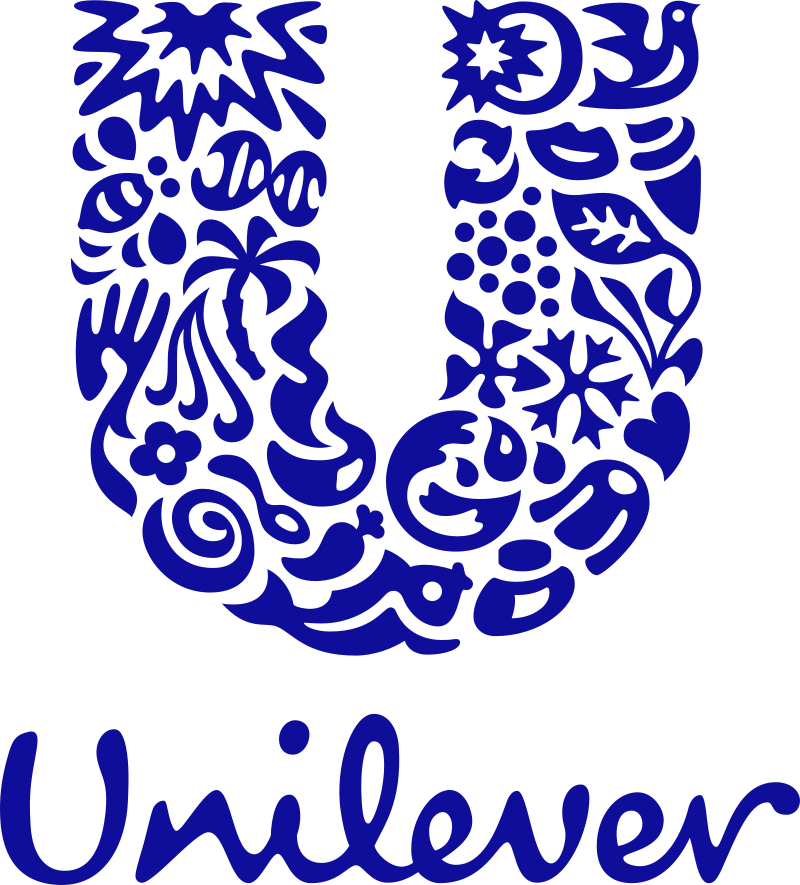
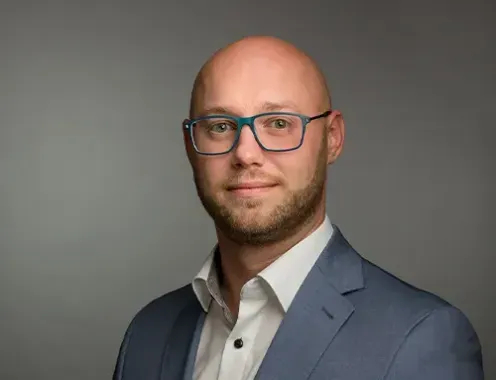
Casper Zorg - Executive HR/PMO
Casper Zorg is a senior HR professional based in Amsterdam. He is currently an Interim HR Executive/PMO at HR Advance, having previously been VP Human Resources at AEG Power Solutions and EMEA HR Director for Hoya Vision Care.
What was the best interview experience that you have had to date?
The best interview experience that I’ve had was very early on in my career. I remember the interview at the time was with a Dutch HR Director. He was very much focused on my areas of strength and weakness and my personal interests within the HR field. I guess that had to do with the fact that I didn’t really have much work experience at the time - maybe two or three years in total - so there wasn’t very much to dig in there, which meant it became a broader conversation around what I was interested in focusing on.
It was my first step into the international HR field, so it was quite a broad role with various projects in a number of countries. It was quite a diverse role to begin with and a good role to start a career with.
Out of all the positions you have held over your career, which position excited you the most?
I would have to say Global Mobility Manager. It’s a position where a lot of different things come together. From a content perspective, you have a legal and a compliance side relating to employment contracts, visas, permits, that kind of thing.
It also puts into play Comp & Ben in multiple countries, migrating a person from country A to country B. That’s a comparison that goes beyond your standard salary and bonus, also looking at tax climates, things like that. And then there are also the cultural differences, moving someone from Brazil to Vietnam, for example. So, there are a lot of different HR elements in that context that come together.
What changes have you seen to the employment market in the Netherlands over the years and, in your opinion, what have been the drivers for the changes?
In the 15 years that I have spent in my career, there have been a couple of macro developments that have really shaken the employment market in the Netherlands.
I remember, when I started my career, we had a credit crisis - companies were restructuring in difficult economic times. Right now, we are in opposite times, where we have a shrinking labour market in western countries, combined with a decreasing interest to work with your hands - that presents challenges for companies in specific sectors.
It goes beyond the war on talent; it’s kind of “social status-driven”. People nowadays are more and more driven by the title they hold and the salary they earn, and that just means that working with your hands is not sexy anymore.
Looking ahead to the next five years or so, what we will also see is a concerning and profound discussion that I’m expecting will take place in the Netherlands - and probably in Western Europe as a whole. There is a very strong increase in convenience - or middleman jobs. There are a lot of people these days who get groceries delivered and order everything online, meaning there is a lot of workforce consumed in the convenience area and, at the same time, we have increasing shortages in what I would call critical occupations like nurses, teachers and probably transportation.
I expect that, in the next five years or so, we will see some societal discussions on how we can refocus the labour force.
What risks have you taken throughout your career and how did they help you get to the level that you are at today?
I’ve chosen my career steps quite specifically, focusing on getting the experience and the knowledge in different fields of international HR. So, HR project management is a great starting point, because you get involved in a whole range of HR topics and aspects, performance management, Comp & Ben development… From there, I specifically moved to Comp & Ben, which was mainly driven by the fact that there’s quite a high demand for that.
The natural step from there was global mobility to get the legal/compliance side, the contract set-up, and get that knowledge, and then the leadership experience. I guess in all those positions, I’ve taken a fair chunk of risk in the sense that I didn’t really have the knowledge and background at the time for those roles, but I basically decided that I would work for the experience and knowledge up to my 30th, and later on for the money. Up until my 30th, I would say that I spent probably ten to 15 hours a week to gain the knowledge and capabilities that I needed to perform my current job well.
The fundamental question in building your career is whether or not you are willing to spend personal time to increase your knowledge and capabilities. More than once, I have had people ask if I could make a certain amount of time available to teach people how to become proficient with Excel and other skills, and I am always willing to do that… between 5pm-7pm; outside of work time. Interestingly enough, about 80% of people are then no longer interested, because they don’t want to spend personal time building their capabilities; they want to spend company time.
What is your favourite business motto and why?
I have a favourite motto, which is actually hanging in my bedroom. Not necessarily a business motto, but it’s a big plaque that just reads, “Life starts at the end of your comfort zone.”
Throughout my career, I’ve had many tips and advice on what I should or shouldn’t do but, ultimately, of course, you need to assess that for yourself.
There were two in particular that stood out for me. One is, work until age x for the experience and thereafter for the money. If you want to bump up your salary earlier, you need to be aware that you will face higher expectations, which means you will no longer be that star talent, because, if you’re paid as a professional, you are expected to act as a professional.
Advice that I remember from my very first job was from the CFO. He recommended that, whenever someone asks you if you’re willing to pick up a certain challenge, first say yes and then consider what you just said yes to. That kind of attitude will automatically push you to take on challenges that are outside of your comfort zone, which will give you the strongest learning curve ultimately.
What advice would you give to aspiring HR leaders?
The best advice I can give is to not go over people’s backs. I have seen too many people elbowing their way to senior positions - it never really works well; you leave a trail of bodies behind. Certainly, for an aspiring HR leader, I think authenticity and the people side are ultimately the most important.
People will naturally know if you’re authentic and if you’re honest. Some people are born with it, most people learn it, but I would say authenticity is probably the biggest asset that you have as an HR leader.
What do you feel the future of HR is?
That’s a very difficult question, because I think the role and the profile of HR as a function has constantly changed and is always changing. I remember when I started my career in difficult economic times, HR was focused on process improvements, restructuring, business transformation, and - as such - was very internally focused.
With the current labour market, the focus is much more on recruitment, onboarding, and on retention, to a large extent, so we see that HR professionals will then automatically be more externally focused.
So, HR kind of follows the macro trends, what is happening in the bigger world, in the country, or maybe even beyond that, and then align our HR perspective accordingly. It depends on the company, the macro situation. This is the interesting thing about HR in general; its’s a bit fluid. The focus is different everywhere and it’s changing all the time.
For the last ten to 15 years or so, we had a pretty profound focus on HR as a business partner; transforming HR functions from administrative payroll/contracts departments into more of a business partnering component. Some people are capable of doing that and some people are not, but that was the worldwide focus, I would say.
The last couple of years, HR is more focused on digital transformation, getting HR systems up and running. I think most companies, by now, have implemented those digital platforms or are currently in the process of finalising that.
Now, we have Web3 and blockchain technology coming up, which is also going to present some interesting developments from a systems perspective. The whole internet and HR systems are moving away from the standard server systems towards a decentralised blockchain storage. That presents some interesting opportunities. When we work for a company, they will have an HR system that will contain a lot of information that you would put in there to create your own profile and, once you start storing that in a blockchain and follow the Web3 development, you would be able to transfer those records between employers, meaning you can build a lifetime profile and better align with the lifetime phasing that everybody goes through. This just serves as an example to indicate that change in one movement can step over into another.
Thank you to Casper for speaking to our HR recruitment team in the Netherlands, led by Katie Insley.
Views and opinions contained within our Executive Interviews are those of the interviewee and not views shared by EMEA Recruitment.







You can also use your social account to sign in. First you need to:
Accept Terms & Conditions And Privacy Policy